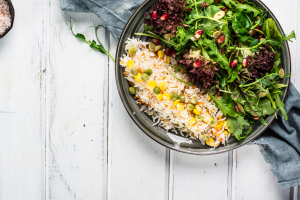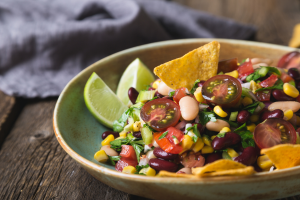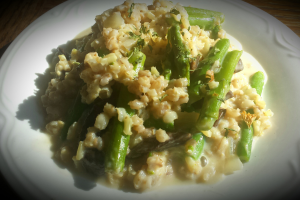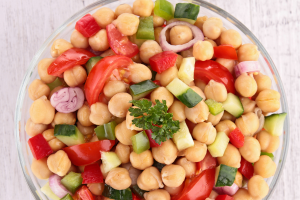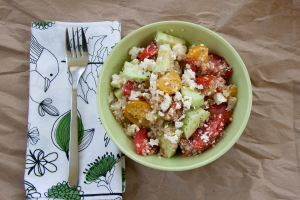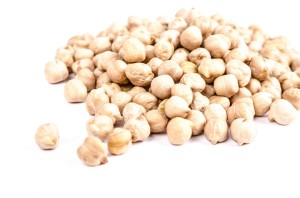Because going meatless once a week may reduce your risk of chronic preventable conditions like:
- cancer
- cardiovascular
- disease
- diabetes
- obesity
And going meatless once a week can also help reduce our carbon footprint and save precious resources like fossil fuels and fresh water.

Recipe for Stacked Vegetable Enchiladas
FOR YOUR HEALTH
Reduce Heart Disease and Stroke
Vegetables, fruit, and whole grains have been shown to protect against cardiovascular disease. One study found that each daily serving of fruits or vegetables was associated with a 4% decline in coronary heart disease, and a 5% lower risk of stroke. Another study found that a diet of 2.5 or more servings of whole grain per day was associated with a 21% lower risk of cardiovascular disease (heart disease, stroke, fatal cardiovascular disease)
Limit Cancer Risk
There is convincing evidence that red meat and processed meat consumption increases the risk of colorectal cancer. There is also limited but suggestive evidence that red meat increases the risk of esophagus, lung, pancreas, and endometrium cancer and that processed meat consumption increases the risk of esophagus, lung, stomach, and prostate cancer.
In contrast, a diet rich in fruit and vegetables decreases the risk of several types of cancers, including mouth, pharynx, larynx, esophagus, and stomach, evidence suggests.
Fight Diabetes
Research suggests that plant-based diets, particularly those low in processed meat, can reduce your risk of type 2 diabetes. Eating a plant-based diet can decrease total calorie consumption which helps you obtain and maintain a healthy weight, a key component to preventing and treating diabetes.
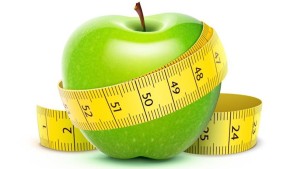 Curb Obesity
Curb Obesity
Several large studies in Europe and the United States have demonstrated that people on plant-based, vegetarian diets tend to have a significantly lower body weight and body mass index (BMI). This may be in part because plant-based diets are rich in fiber (which is not found in animal products). Fiber contributes to fullness, resulting in lower calorie intake and less overeating.
Recipe for 30-Minute Quinoa Enchilada Skillet
Live Longer
Evidence suggests that eating a diet rich in fruits and vegetables, and a limited amount of red meat can increase longevity, whereas red and processed meat consumption is associated with increases in deaths due to cancer and cardiovascular disease.
Improve The Nutritional Quality of Your Diet
Going meatless encourages consumption of plant-based sources of protein, like beans and peas. Consuming beans and peas results in a higher intake of fiber, protein, folate, zinc, iron, and magnesium. Also, diets high in beans and peas are associated with lower intakes of saturated fat and total fat.
FOR YOUR WALLET
Curb Healthcare Spending
Each year in the United States, chronic diseases like heart disease, stroke, cancer, and diabetes cause 7 in 10 deaths, and account for 75% of the $2 trillion spent on medical care. In 2008, the estimated health care costs related to obesity were $147 billion. By reducing our risk for these conditions, we can curtail healthcare spending nationwide.
Cut Weekly Budget
Many people save money by adding meatless meals to their weekly menus. Meatless meals are built around vegetables, beans and grains—instead of meat, which tends to be more expensive. This is partly because producing meat requires extra expenses like feed and transportation. Though it can be challenging to serve healthy meals on a budget, going meatless once a week can help conserve money for more fruits and vegetables.
 FOR THE ENVIRONMENT
FOR THE ENVIRONMENT
Minimize Water Usage
The water needs of livestock are much greater than those of vegetables and grains.
– Approximately 1,850 gallons of water are needed to produce a single pound of beef.
– Approximately 39 gallons of water are needed to produce a pound of vegetables.
Americans consume nearly four times the amount of animal protein than the global average. When compared with current food intake in the US, a vegetarian diet could reduce water consumption by up to 58% per person.
Reduce Greenhouse Gases
Studies show that meat production produces significantly more greenhouse gases than vegetables, including carbon dioxide, Methane and Nitrous Oxide – the three main contributing sources of greenhouse gas. Beef was found to produce a total of 30 kg of greenhouse gas (GHG) per kg of food, while carrots, potatoes and rice produce .42, .45 and 1.3 kg GHG per kg of food, respectively.
Reduce Fuel Dependence
About 25 kilocalories of fossil fuel energy is used to produce 1 kilocalorie of all meat based protein, as compared with 2.2 kilocalories of fossil fuel input per 1 kilocalorie of grain based protein produced. The meat industry uses so much energy to produce grain for livestock that if instead we used the grain to feed people following a vegetarian diet, it would be enough to feed about 840 million people.
We want to hear from you
What motivates you to cut back on your meat consumption? We want to know.
